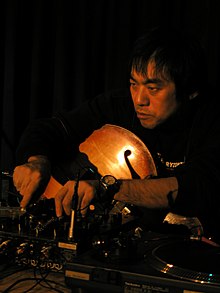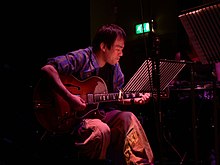Otomo Yoshihide
Otomo Yoshihide 大友 良英 | |
|---|---|
 Otomo performing live at Club w71 in Weikersheim in 2007 | |
| Background information | |
| Born | August 1, 1959 Yokohama, Japan |
| Genres | Jazz, noise |
| Occupation(s) | Multi-instrumentalist, composer |
| Instrument(s) | Guitar, turntable |
| Years active | 1987-present |
| Labels | Recommended Records, P-Vine Records, Tzadik Records, Erstwhile Records |

Otomo Yoshihide[1] (大友 良英, Ōtomo Yoshihide, born August 1, 1959) is a Japanese composer and multi-instrumentalist. He first came to international prominence in the 1990s as the leader of the experimental rock group Ground Zero, and has since worked in a variety of contexts, ranging from free improvisation to noise, jazz, avant-garde and contemporary classical. He is also a pioneering figure in the EAI-scene, and is featured on important records on labels like Erstwhile Records. He has composed music for many films, television dramas, and commercials. He plays guitar, turntables, and electronics.[citation needed]
Biography
Early years
Otomo was born in Yokohama in 1959, but due to his father's job, moved to Fukushima when he was nine years old.[2] In high school, he frequented jazz cafés and started his own band.[2] After entering university, he began studying under the improvisational jazz guitarist, Masayuki Takayanagi.[2] He began performing around the world and released his first album in 1991 in Hong Kong.[2] It was when the music he composed for a 1994 Hong Kong film was well received at the Cannes Film Festival that he also began to work as a composer.[2]
Music
Otomo released Plays the Music of Takeo Yamashita in 1999.[3]
Film and television
Otomo has composed music for a number of films and television programs,[4] including Naoki Kato's Abraxas,[5] Tsuyoshi Inoue's The Town's Children,[6] and Ryuichi Hiroki's Yellow Elephant.[7] He composed the music for the 2013 NHK morning television drama Amachan and it became his most commercially successful work up to that point. The soundtrack for Amachan reached number 5 on the Oricon Albums Chart,[8] and Kyoko Koizumi's version of the song Shiosai no Memorī from the drama, composed by Otomo, reached number 2 on the Oricon Singles Chart.[9] He performed live on New Year's Eve at the 2013 Kōhaku Uta Gassen.[10]
Discography
Studio albums
- Otomo Yoshihide (1987)
- Problem (1988)
- Duo (1989) with Junji Hirose
- Silanganan Ingay (1989) with Junji Hirose
- No Problem (1990) with No Problem
- Who Is Otomo Yoshihide? (1991)
- Visions of Japan (1991) with Yuji Katsui and Hiroshi Higo
- Ground-0, No. 0 (1991)
- Terminal-Zero (1991)
- We Insist? (1992)
- Turntables Solo (1992)
- Memory Disorder (1993)
- Peril (1993) with Peril
- The Night Before the Death of the Sampling Virus (1993)
- Ground Zero (1993) with Ground Zero
- Early Works 1: 81-85 (1994)
- Monogatari: Amino Argot (1994) with Carl Stone
- Balance of Power: Variety (1994) with Hiedaki Sasaki
- All at Once at Any Time (1994) with David Moss and John King
- Multiverse (1994) with Peril
- Null & Void (1995) with Ground Zero
- Tatakiuri (1995) with Jon Rose
- Revolutionary Pekinese Opera (1995) with Ground Zero
- Revolutionary Pekinese Opera, Version 1.28 (1996) with Ground Zero
- Duo Improvisation (1996) with Yasuhiro Otani
- p53 (1996) with p53
- Twins!! (1996) with Bob Ostertag
- Ututu: Doppo Jukyo-at no Ho e Atelier El Sur (1996) with Kiwao Nomura and Keiki Midorikawa
- My Dear Mummy (1997) with Masahiko Shimada
- Memory & Money (1997) with Les Sculpteurs de Vinyl
- Conflagration (1997) with Ground Zero
- Consume Red (1997) with Ground Zero
- Plays Standards (1997) with Ground Zero
- Sound Factory (1997)
- Melted Memory (1997)
- Vinyl Tranquilizer (1997)
- Filament 1 (1998) with Filament
- Consummation (1998) with Ground Zero
- Gravity Clock (1998) with I.S.O.
- Memory Defacement (1998)
- Television Power Electric (1999) with Jim Baker, Aeron Bergman, Todd Carter, Brent Gutzeit, Michael Hartman, Ernst Long, and R. Wilkus
- Filament 2: Secret Recordings (1999) with Filament
- I.S.O. (1999) with I.S.O.
- Bits, Bots and Signs (1999) with Voice Crack
- Metal Tastes like Orange (1999) with Masahiko Okura, Günter Müller, and Taku Sugimoto
- Cathode (1999)
- Plays the Music of Takeo Yamashita (1999)
- Four Focuses (1999) with Martin Tétreault, Yasuhiro Otani, and Sachiko M
- 21 Situations (1999) with Martin Tétreault
- Panty Christ (1999) with Justin Bond and Bob Ostertag
- Pilgrimage (1999) with Microcosmos
- Without Kuryokhin (1999) with Kenny Millions
- Moving Parts (2000) with Christian Marclay
- Music for Dance Art Hong Kong's "Memory Disorder" (2000)
- Anode (2001)
- Flutter (2001) with Otomo Yoshihide's New Jazz Quintet
- 29092000 (2001) with Filament
- Thumb (2002) with Keith Rowe, Oren Ambarchi, Sachiko M, and Robbie Avenaim
- Ensemble Cathode (2002)
- Les Hautes Solitudes: A Philippe Garrel Film: Imaginarry Soundtrack (2002) with Taku Sugimoto and Sachiko M
- Miira ni Naru made: German Version (2002) with Masahiko Shimada
- Pulser (2002) with Otomo Yoshihide's New Jazz Quintet
- Invisible Architecture No. 1 (2002) with Philip Jeck and Martin Tétreault
- Ajar (2002) with Almá Fury, Yasuhiro Otani, and Xavier Charles
- Dreams (2002) with Otomo Yoshihide's New Jazz Ensemble
- Tails Out (2003) with Otomo Yoshihide's New Jazz Quintet
- ONJQ + OE (2003) with Otomo Yoshihide's New Jazz Quintet and Tatsuya Oe
- ONJQ + OE: Short Density (2003) with Otomo Yoshihide's New Jazz Quintet and Tatsuya Oe
- Turntables and Computers (2003) with Nobukazu Takemura
- Studio—Analogique—Numérique (2003) with Martin Tétreault
- Time Travel (2003) with Günter Müller
- Warholes or All Andy Would Enjoy (And Fear) / Warhol Memory Disorder (2003) with Lengow, Heyermears, and Sachiko M
- Soup (2003) with Bill Laswell and Yasuhiro Yoshigaki
- Loose Community (2003) with Park Je Chun and Mi Yeon
- The Crushed Pellet (2003) with Eiichi Hayashi and Yoshisaburo Toyozumi
- Turntable Solo (2004)
- Compositions for Guitars Vol. 2 (2004) with Tetuzi Akiyama, Toshimaru Nakamura, and Taku Unami
- Brackwater (2004) with Korber, Tomas, eRikm, and Toshimaru Nakamura
- Good Morning Good Night (2004) with Sachiko M and Toshimaru Nakamura
- Intonarumori Orchestra (2004) with Intonarumori Orchestra
- Filament Box (2004) with Filament
- 1. Grrr (2004) with Martin Tétreault
- 2. Tok (2005) with Martin Tétreault
- 3. Ahhh (2005) with Martin Tétreault
- 4. Hmmm (2005) with Martin Tétreault
- Out to Lunch (2005) with Otomo Yoshihide's New Jazz Orchestra
- See You in a Dream (2005) with Yuki Saga
- Trace Cuts (2005) with eRikm, Martin Tétreault
- Otomo Yoshihide's New Jazz Orchestra (2005) with Otomo Yoshihide's New Jazz Orchestra
- Time Magic City (2006) with BusRatch
- Episome (2006) with Bill Laswell and Tatsuya Yoshida
- Sora (2007)
- Prisoner: A Film by Adachi Masao: Original Soundtrack (2007)
- Multiple Otomo (2007)
- Encounter (2007) with Itaru Oki
- Modulation with 2 Electric Guitars and 2 Amplifiers (2007)
- Modulation with 2 Electric Guitars and 2 Amplifiers: Alternative Version (2008)
- Core Anode (2008)
- Country Kill (2008) with Joy Heights
- Les Archives Sauvées des Eaux (2008) with Luc Ferrari
- Guitar Duo (2008) with Seiichi Yamamoto
- Sweet Cuts, Distant Curves (2008) with Choi, Joonyong, Hong Chulki, and Sachiko M
- Monte Alto Estate (2009) with Sim
- Guitar Duo x Solo (2009) with Shinichi Isohata
- Shinjuku Crawl (2009) with The Thing
- Good Cop Bad Cop (2009) with Derek Bailey, Tony Bevan, and Paul Hession
- Ultra Miracle Love Story (2009)
- Book from Hell (2010) with Zai Kuning and Dickson Dee
- 3-Part In(ter)ventions (2012) with Jim O'Rourke
- Piano Solo (2013)
- Existence (2013) with Shinichi Isohata
- Quintet/Sextet (2013) with Sachiko M, Evan Parker, John Edwards, Tony Marsh, and John Butcher
Live albums
- Live at Aketa-no-mise in Tokyo, July 28, 1989 (1989)
- Solo Live in Kyoto 93 (1995)
- Revolutionary Pekinese Opera, Tokyo 1995 (1995) with Ground Zero
- Live! (1995) with Eye Yamatsuka
- Live!! (1996) with Eye Yamatsuka
- Session 18 Oct. 1997 (1998) with Seed Mouth
- Live at Otis! (1998) with Sachiko M and Yoshimitsu Ichiraku
- Live (1998) with I.S.O.
- Last Concert (1999) with Ground Zero
- Guitar Solo Live 1 (1999)
- Live (2002) with Otomo Yoshihide's New Jazz Quintet
- Turntables Solo Live, 28 Feb 2002 in Tokyo (2002)
- Soup Live (2004) with Bill Laswell and Yasuhiro Yoshigaki
- Erst Live 004 (2005) with Christian Fennesz, Sachiko M, and Peter Rehberg
- Erst Live 005 (2005) with Keith Rowe, Sachiko M, and Toshimaru Nakamura
- Concert in St. Louis (2005) with Grnr Coleman, Franz Hautzinger, and Sachiko M
- Guitar Solo: 12 October 2004 @ Shinjuku Pit Inn, Tokyo + 1 (2005)
- ONJQ Live in Lisbon (2006) with Otomo Yoshihide's New Jazz Quintet
- Live 1992 (2007) with Ground Zero
- Live Vol. 1: Series Circuit (2007) with Otomo Yoshihide's New Jazz Orchestra
- Live Vol. 2: Parallel Circuit (2007) with Otomo Yoshihide's New Jazz Orchestra
Singles
- Otomo + Mao (1995)
- Revolutionary Pekinese Opera, Version 1.50 (1996) with Ground Zero
- Live Mao '99 (1996) with Ground Zero
- Untitled (1996) with Eye Yamatsuka
- Museum of Towing & Recovery (1998) with Steve Beresford
- Lupin the Third: Ending Theme (1999)
- Split 7" (1999) with Christian Marclay
- Re/cycling Rectangle (2000)
- Digital Tranquilizer Ver. 1.0 (2004)
- Digital Tranquilizer Ver. 1.01 (2004)
- 4 Speakers (2009)
DVDs

- Dark Room Filled with Light (2006) with Filament
- Music(s) (2006)
- Ensembles 09: Pre-opening Live at Shinjuku Pit Inn (2009)
As sideman
With Rova::Orchestrova
- Electric Ascension (Atavistic, 2005)
Film scores
Film
- The Blue Kite (1993)
- Summer Snow (1995)
- Postman (1995)
- Kaza-hana (2000)
- Blue (2001)
- Iden & Tity (2003)
- Canary (2005)
- Boku wa Imōto ni Koi o Suru (2007)
- Ultra Miracle Love Story (2009)
- Tokyo Island (2010)
- Abraxas (2010)
- The Town's Children (2011)
- Olo the Boy from Tibet (2012)
- Botchan (2012)
- Yellow Elephant (2013)
- Junan (2013)
- Piece of Cake (2015)[11]
Television
- Amachan (2013)
References
- ^ "PROFILE" (Archive). Otomo Yoshihide Official Website. Retrieved on May 30, 2015. "When you write your Japanese name in English alphabet[...]For this reason, I would like to continue using the notation "Otomo Yoshihide" as before."
- ^ a b c d e 大友良英さんプロフィル. Asahi Digital (in Japanese). Asahi Shimbun. Retrieved 26 January 2014.
- ^ "Yoshihide Otomo Plays the Music of Takeo Yamashita". Allmusic.
- ^ "Otomo Yoshihide o kaibai suru: Yasuo Ozawa x Yoshihide Otomo". 21st Century Museum of Contemporary Art, Kanazawa. Retrieved 22 April 2013.
- ^ "Sundance Review: Punk Rock Meets Buddhism in Naoki Kato's Exquisitely Crafted Debut Feature 'Abraxas'". The Hollywood Reporter. 26 January 2011.
- ^ "The Town's Children". Special Broadcasting Service.
- ^ "'Kiiroi Zo'". The Japan Times. 8 February 2013.
- ^ 連続テレビ小説「あまちゃん」オリジナル・サウンドトラック (in Japanese). Oricon. Retrieved 26 August 2013.
- ^ 潮騒のメモリー (in Japanese). Oricon. Retrieved 26 August 2013.
- ^ "Yoshihide Ōtomo – Amachan Theme: New music from Japan". The Guardian. 13 January 2014.
- ^ "Miliyah Kato, Kazunobu Mineta Perform Live-Action Piece of Cake Film's Theme". Anime News Network. April 23, 2015. Retrieved April 24, 2015.
External links
- Template:Official blog
- Yoshihide Otomo at IMDb
- Otomo Yoshihide discography at Discogs
